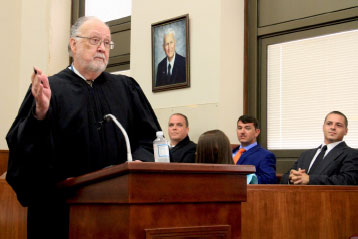
Administrative Office of Courts
|
Nine graduate from Nineteenth Circuit Intervention Court September 8, 2022 “Mommy!” a child exclaimed excitedly from the audience as intervention court graduates filed into Jackson County Circuit Court on the morning of Sept. 6 in Pascagoula. 
Family and friends, court staff and visitors gathered to celebrate their graduation from the Nineteenth Judicial District Intervention Court. The longest time spent in the program was four years. The graduates’ accomplishments included staying drug-free, keeping full-time jobs and earning professional licenses, vocational certificates and college degrees. At a more personal level, the five men and four women regained the trust of the families who stood by them. They regained custody of children. One who earned a real estate license is the mother of an 18-month-old boy born drug-free. And a father who graduated from the program held his seven-week-old son. The babies didn’t fuss as family members and friends took turns holding them. They had no idea of how their parents’ participation in Intervention Court changed their future prospects for healthy lives. During the past 16 years, 928 drug-free babies have been born to female intervention court participants statewide, Circuit Judge Robert P. Krebs told the graduation audience. A Bureau of Justice Statistics study estimates that each healthy, drug-free infant saves the state an average of $750,000 during the first 18 years of life. The estimate assumes that without the care provided by intervention courts, drug addicted mothers would have given birth to babies with health issues that would require long-term medical care. Those 928 drug-free babies represent $696 million in savings for the state. But more than the money, “saving 928 babies’ lives is a big deal,” Judge Krebs said. Intervention courts provide a second chance for people whose lives have been destroyed by drug addiction. Intervention courts seek to rehabilitate drug-using offenders through drug treatment and intense supervision with drug testing and frequent court appearances. Intervention courts provide participants access to resources and opportunities they need by coordinating the efforts of the judiciary, prosecution, defense counsel, probation, law enforcement, treatment, mental health and social service providers. Prosecutors, public defenders, treatment providers and others who work with the Intervention Court participants were in the audience during the graduation. “Drug Court has been a blessing for me,” a 31-year-old graduate told the crowd. He recalled becoming hooked on drugs at age 14, and using methamphetamine at 15. “I spent most of my life in jail,” he said. “I’ve been in nine different rehabs.” Supervision of the Intervention Court made him stick with rehabilitation. Two of the graduates are U.S. Marine veterans. Judge Krebs created a program especially tailored to the needs of military veterans in 2011. Both of the veteran program graduates are trained as mentors and will assist other military veterans enrolled in the 19th Judicial District Intervention Court, said Katherine Parker, coordinator for the intervention court. “The Marine Corps teaches you to be self-reliant,” said a 48-year-old man who served two deployments in Africa and the Middle East. Asking for help wasn’t part of his mentality. He worked off shore overseas for 18 years after leaving the Marines. His life started into a downward spiral when he came home. He landed in Intervention Court. “It put me back in touch with the V.A. and taught me to ask for help,” he said. The intervention court connected him to Veterans Administration services that he didn’t know about. Intervention Court staff produced a video of all the graduates talking about their struggles and accomplishments. One by one, they talked about where they were and where they are now. Chaos, misery and despair were some of their oft-repeated descriptions of their past. One woman said that life before consisted of “living for my next high.” She has her family back. “I’m able to take care of my kids myself.” Another graduate is working toward earning a bachelor’s degree in social work. “My objective is to help others with some of the things I struggled with,” he said, recalling that his wife and kids left due to his drug addiction. Judge Krebs said that the graduation ceremony will be his last. He will retire in December after 20 years on the bench. He began supervising an intervention court in 2004. “For 18 years, I’ll tell you that drug court works,” he said. The nine participants who graduated on Sept. 6 have paid a total of $22,497 in fines and restitution plus $14,310 in fees, Judge Krebs said. They did 1,800 hours of community service work; each must perform 200 hours of community service to graduate. And by remaining out of prison and supporting themselves, they saved taxpayers $529,410 in avoided incarceration costs. On a statewide level, intervention courts have produced a savings of more than a billion dollars for taxpayers since detailed data began to be kept in Fiscal Year 2006. That includes avoided health care costs for drug-free babies as well as avoided incarceration costs for intervention court participants. Avoided incarceration costs exceed $823 million statewide between Fiscal Year 2006 and Fiscal Year 2022. Adult intervention court participants statewide paid more than $17 million in fines from FY 2006 through FY 2022. During that time, more than 9,300 intervention court participants graduated from intervention courts. More than 3,500 people are currently enrolled in the state’s 43 intervention courts. #### |